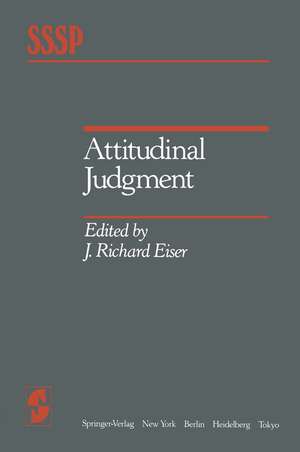Attitudinal Judgment: Springer Series in Social Psychology
Editat de Richard J. Eiseren Limba Engleză Paperback – 12 oct 2011
Din seria Springer Series in Social Psychology
-
 Preț: 40.07 lei
Preț: 40.07 lei - 15%
 Preț: 643.48 lei
Preț: 643.48 lei -
 Preț: 387.96 lei
Preț: 387.96 lei -
 Preț: 384.48 lei
Preț: 384.48 lei -
 Preț: 386.00 lei
Preț: 386.00 lei - 15%
 Preț: 694.69 lei
Preț: 694.69 lei -
 Preț: 394.87 lei
Preț: 394.87 lei -
 Preț: 387.96 lei
Preț: 387.96 lei - 15%
 Preț: 642.36 lei
Preț: 642.36 lei -
 Preț: 389.31 lei
Preț: 389.31 lei - 15%
 Preț: 640.06 lei
Preț: 640.06 lei - 15%
 Preț: 696.02 lei
Preț: 696.02 lei - 18%
 Preț: 891.17 lei
Preț: 891.17 lei -
 Preț: 392.60 lei
Preț: 392.60 lei - 18%
 Preț: 889.60 lei
Preț: 889.60 lei -
 Preț: 382.18 lei
Preț: 382.18 lei -
 Preț: 387.75 lei
Preț: 387.75 lei -
 Preț: 388.90 lei
Preț: 388.90 lei -
 Preț: 384.48 lei
Preț: 384.48 lei - 18%
 Preț: 726.37 lei
Preț: 726.37 lei -
 Preț: 384.86 lei
Preț: 384.86 lei - 18%
 Preț: 779.57 lei
Preț: 779.57 lei -
 Preț: 380.07 lei
Preț: 380.07 lei -
 Preț: 387.20 lei
Preț: 387.20 lei -
 Preț: 392.60 lei
Preț: 392.60 lei - 18%
 Preț: 725.43 lei
Preț: 725.43 lei -
 Preț: 386.22 lei
Preț: 386.22 lei -
 Preț: 387.38 lei
Preț: 387.38 lei - 15%
 Preț: 640.71 lei
Preț: 640.71 lei - 18%
 Preț: 777.03 lei
Preț: 777.03 lei - 15%
 Preț: 639.73 lei
Preț: 639.73 lei -
 Preț: 382.18 lei
Preț: 382.18 lei -
 Preț: 390.25 lei
Preț: 390.25 lei - 18%
 Preț: 781.45 lei
Preț: 781.45 lei -
 Preț: 382.75 lei
Preț: 382.75 lei -
 Preț: 386.99 lei
Preț: 386.99 lei -
 Preț: 382.75 lei
Preț: 382.75 lei -
 Preț: 428.46 lei
Preț: 428.46 lei - 15%
 Preț: 533.72 lei
Preț: 533.72 lei -
 Preț: 388.52 lei
Preț: 388.52 lei -
 Preț: 393.13 lei
Preț: 393.13 lei -
 Preț: 389.11 lei
Preț: 389.11 lei -
 Preț: 387.75 lei
Preț: 387.75 lei
Preț: 386.00 lei
Nou
Puncte Express: 579
Preț estimativ în valută:
73.86€ • 77.32$ • 61.12£
73.86€ • 77.32$ • 61.12£
Carte tipărită la comandă
Livrare economică 07-21 aprilie
Preluare comenzi: 021 569.72.76
Specificații
ISBN-13: 9781461382539
ISBN-10: 146138253X
Pagini: 260
Ilustrații: XVI, 239 p.
Dimensiuni: 155 x 235 x 14 mm
Greutate: 0.37 kg
Ediția:Softcover reprint of the original 1st ed. 1984
Editura: Springer
Colecția Springer
Seria Springer Series in Social Psychology
Locul publicării:New York, NY, United States
ISBN-10: 146138253X
Pagini: 260
Ilustrații: XVI, 239 p.
Dimensiuni: 155 x 235 x 14 mm
Greutate: 0.37 kg
Ediția:Softcover reprint of the original 1st ed. 1984
Editura: Springer
Colecția Springer
Seria Springer Series in Social Psychology
Locul publicării:New York, NY, United States
Public țintă
ResearchCuprins
I. Value, Relativity, and Polarization.- 1. Value Judgments: Toward a Relational Theory of Happiness.- 2. Psychological Perspective in Attitude Research.- 3. Accentuation Theory, Polarization, and the Judgment of Attitude Statements.- 4. The Polarizing Effects of Affective Intensity.- II. Intergroup Attitudes.- 5. Attributing Attitudes to Members of Groups.- 6. Stereotyping and Sampling Biases in Intergroup Perception.- 7. Language and Intergroup Attitudes.- III. Salience, Schematic Processing, and Attitude Change.- 8. Dimensional Salience, Judgment, and Attitudes.- 9. Attitudes and Attitude Change: Mindlessness—Mindfulness Perspective.- 10. Schematic Bases of Belief Change.- Author Index.














